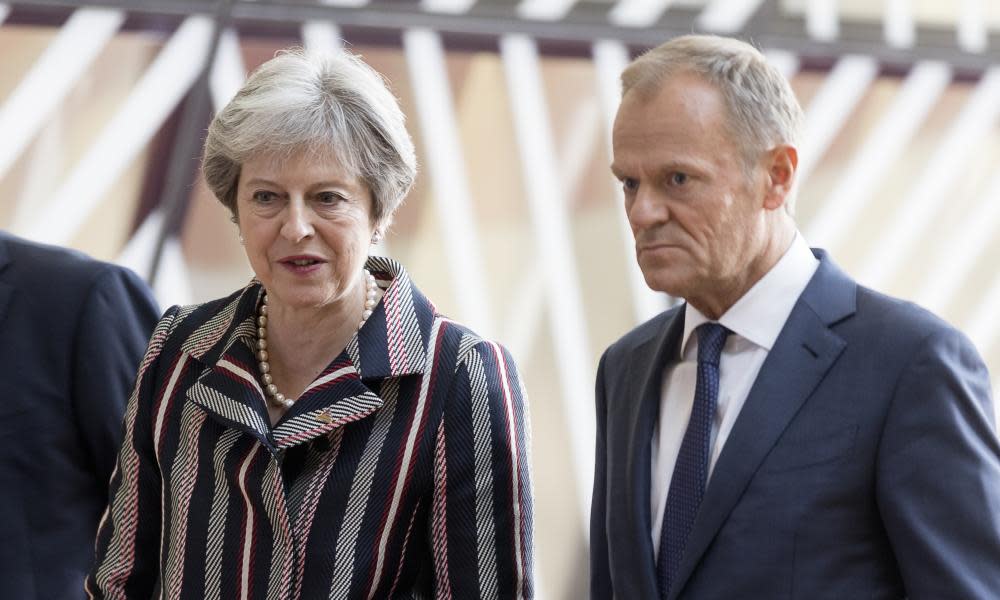Theresa May seeks Brexit compromises as fear of no-deal exit looms larger

Theresa May will test the tolerance of her cabinet for fresh Brexit compromises on Tuesday, with Britain’s negotiators desperate for a breakthrough in time to convince EU leaders to convene a crunch summit next month.
With no European council formally scheduled until December, ministers are becoming increasingly anxious about the growing risk of a failure to reach a deal and the impact of continued uncertainty on the economy.
“Everyone’s still hoping for November,” said one senior Whitehall source. The foreign secretary, Jeremy Hunt, told the BBC that the government was “four weeks before the November deadline that’s been talked about”.
The Brexit secretary, Dominic Raab, has told cabinet colleagues that November is the final realistic moment to switch to full-blown no-deal planning if the government is to be ready by next March.
Ministers fear that businesses and financial markets will start betting on a no-deal outcome in the coming weeks, weighing on the pound and creating an unstable economic backdrop to the talks.
Much of Tuesday’s cabinet meeting is to be devoted to Brexit. The prime minister will update colleagues on this week’s European council in Brussels, where she floated the idea of extending the transition period – during which the UK would remain subject to EU laws – to help kickstart the stalled talks.
But the sticking points remain the same as they were when talks broke down last Sunday – and the EU’s chief negotiator, Michel Barnier, stressed on Friday that the main obstacle to agreement was what he called the “complex” politics in Westminster.
Asked whether a deal was still possible, Barnier told France Inter radio: “I have no deep conviction on this subject, because in the UK the political situation is very complex and I don’t know what decisions Theresa May will take. I hope for a deal; I am working for it, because it is in our common interest.”
May will have to test the wriggle room her cabinet is prepared to give negotiators over the next fortnight.
Government insiders remain hopeful they can persuade EU leaders to give Barnier the green light to drop the “backstop to the backstop” – the insistence that the EU’s proposal for avoiding a hard border in Ireland must be included in the legally binding withdrawal agreement.
Hunt reiterated on Friday that the government would not accept any proposal that “means the potential breakup of the United Kingdom”.
Yet senior Brussels sources remain insistent that the EU’s backstop, which involves Northern Ireland alone effectively staying inside the customs union and single market, must remain in the final text.
Several ministers, including Hunt, Andrea Leadsom and Michael Gove are pressing for a mechanism to be written into the backstop text to allow the UK to extricate itself, although they appear to have accepted that having a date written into the text is impossible.
Hunt said: “There has to be a way that we can exit from it, and that has to be a sovereign decision of the UK parliament. What is not acceptable is that we could be indefinitely in the customs union.”
The idea of extending the transition had been signed off in principle by the cabinet and also discussed and not rejected by ministers at the so-called pizza summit in Leadsom’s office on Monday night.
But it infuriated some backbenchers and prompted a warning from the Scottish secretary, David Mundell, who is concerned it could mean the UK still being inside the common fisheries policy at the time of the Holyrood elections in May 2021.
Outside the cabinet, May faces a growing backlash from MPs concerned about the UK’s future trading relationship with the EU. Downing Street is optimistic about the negotiations on the “future framework”, but admits that only headings have been agreed, with just a few weeks left to go.
Matthew Pennycook, the a shadow Brexit minister, said: “Businesses and communities across the country are crying out for clarity about what our future relationship with the EU will look like after Brexit.
“If the government’s deadline for reaching a deal with the EU slips any further, then we face the very real risk of businesses implementing no-deal plans and taking investment out of the UK. We can’t have any more failed summits and missed deadlines. The Tories have got to get a grip.”
If a deal is delayed until the next formal summit in December, the government may struggle to find the time to allow MPs to vote on it and pass the necessary legislation in time for March next year.
Senior Conservatives warn that if the deal is to pass through the House of Commons, May will have to pivot from the cautious approach she has displayed in recent weeks to selling her deal.
Meanwhile, three former cabinet secretaries, Lord Armstrong, Lord Butler and Lord O’Donnell, have hit back at Brexiters, accusing them of undermining the civil service with their constant attacks, particularly on May’s chief Brexit adviser Olly Robbins. O’Donnell told the Times the way to strike a good deal with the EU was not by “attacking our own officials”.

 Yahoo News
Yahoo News 
